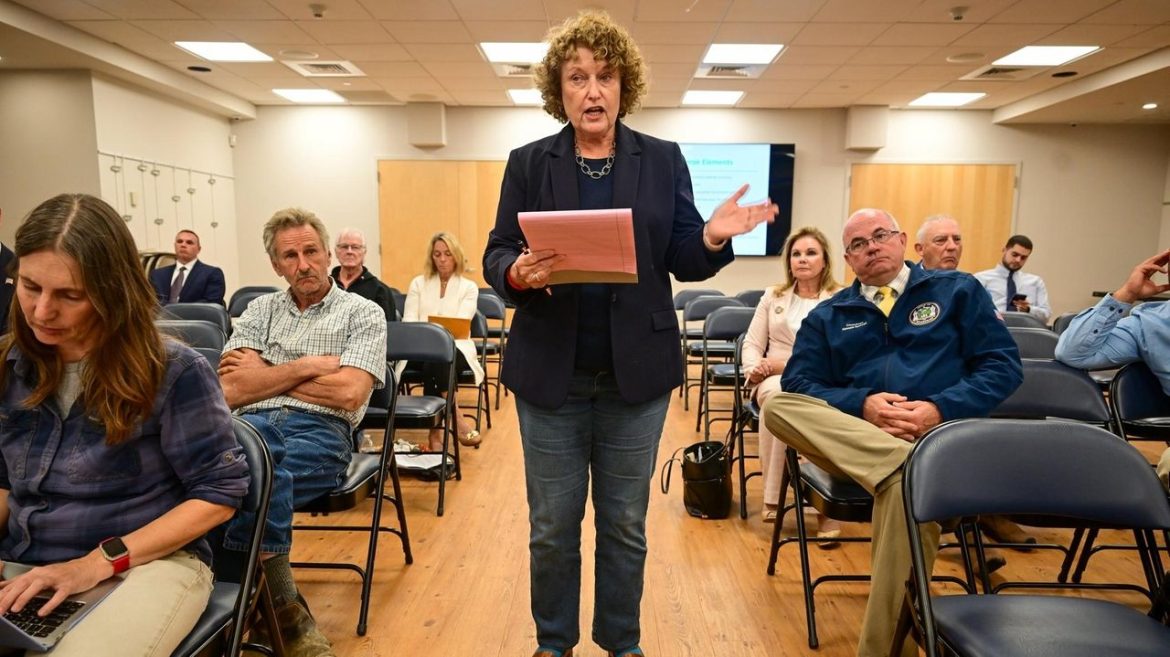Riverhead Town and the Suffolk County Water Authority are deadlocked over who should decide whether the utility is immune from zoning laws as it seeks to build a $35 million water pipeline on the North Fork.
The water authority plans to build an 8.5 mile transmission line to deliver water from a supply in the pine barrens, in Southampton Town, to customers in Southold. Suffolk County Water Authority officials have said its system struggles to meet demand in the region because of shallow wells and saltwater intrusion.
But the planned route, via Sound Avenue, has alarmed Riverhead officials, sparking concerns about traffic jams and disruptions on the corridor famed for its farms, wineries and other tourist attractions.
After holding an August hearing, the Riverhead Town Board ruled Tuesday that the SCWA is not immune and must comply with town zoning rules. Now, the water authority is conducting its own hearings, claiming it has immunity from Riverhead’s land use laws.
Attorneys for the water authority laid out their reasoning Thursday at a hearing at Riverhead Free Library.
“The project here would serve a quintessential government function … and will promote the public health of county residents,” said Richard Finkel, an attorney for the water authority at the firm Bond, Schoeneck & King PLLC.
In the case of projects that have an “overriding” public purpose, such as clean water, Finkel said “courts have not hesitated to find a project exempt from the host municipalities’ land use regulations.”
Riverhead residents and officials were more critical of the authority’s actions, questioning purported benefits. Riverhead town is served by its own water district.
“The water authority’s perceived benefit to Southold Town does not, in my opinion, supersede the negative impacts of the project on Riverhead town’s infrastructure [or] the negative impact on the economies of businesses located along Sound Avenue,” said Joan Cear of Jamesport.
Thursday’s hearing was part of a legal framework known as a Monroe Balancing Test, which sets nine factors to consider in granting immunity to certain government projects, including public benefits, its impacts and whether alternatives were considered.
Guidance issued by the state Department of State says when a government entity proposes a project in another’s jurisdiction, “the two governments should assume that the action is subject to the host community’s zoning requirements,” according to a state publication.
Officials at the Department to State division of Local Government declined to comment on the conflict, saying it has no oversight of how the tests are administered.
Riverhead officials blasted the idea of the water authority deciding its own immunity.
“It’s kind of like letting the fox run the hen house,” Riverhead Supervisor Tim Hubbard said at a meeting Tuesday.
SCWA officials contend they are acting within their rights.
Kathleen Bennett, from the same law firm, cited a 2017 state supreme court decision that sided with the Manhasset-Lakeville Water District, ruling that the Village of Munsey Park zoning laws did not apply to construction of water storage tanks.
“Ultimately this issue will likely be resolved by a court, but SCWA is very confident in its right to hold the hearings and in its immunity from all local zoning laws based on well settled case law involving the Monroe test,” Bennett wrote in an email.
Riverhead also criticized the project for threatening economic interests and quality of life along Sound Avenue and said the SCWA failed to provide specific maps and plans or consider alternate routes.
Southold officials have also questioned the need for increased supply, which could spur unwanted development.
Southold supervisor Al Krupski said the town is eager to see the results of an aquifer study being conducted by the United States Geological Survey and the state Department of Environmental Conservation.
“It would be prudent to wait for that,” Krupski said in an interview. “They don’t have a vested interest in selling our water. They’re doing it from a strictly scientific manner. … We should know what the water supply is like here before we make these decisions.”
Riverhead Town officials met in a closed-door executive session last week to discuss “possible litigation” with the water authority, but town attorney Erik Howard said no decision was made.
“This could be easily addressed with appropriate interagency/municipality communication and cooperation,” Howard said Thursday.
#Riverhead #Suffolk #water #authority #split #pipeline #zoning #law



